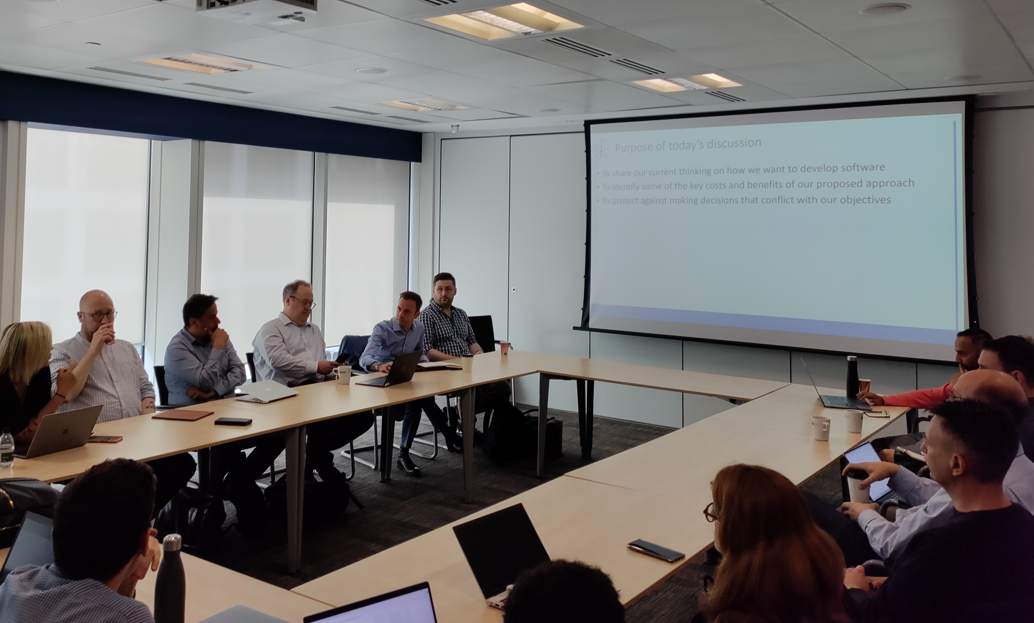Crown Prosecution Service (CPS) Software Development Standards and Practices Roundtable; Round-up

The session included an overview of the CPS’s development of its CMS, and how the Casework project will bring benefit to users across the Criminal Justice System (CJS);
- To share CPS’s wider thinking around developing software;
- To identify some of the key costs and benefits of the proposed approach;
- To understand how the capabilities framework between in-house and outsourced development teams will be mapped.
Since the roundtable, Matthew has fed back the following:
Your invitees consistently engage in a positive, constructive and thoughtful way and the feedback helps us ensure that we’re on track to engage usefully with the market, in the interests of victims and witnesses.
Summary
- Overview of the Project
CMS has been in development for 20 years, with projects adding various features over time, which has been conducted without a broader vision or target architecture for the system;
- Release business benefits; by developing products that meet the needs of users, including; task management, document management, case-view.
- Improve correspondence between stakeholders; including social workers, lawyers and judges.
- Help the process of breaking down highly complex documentation types; ready for analysis and decision-making.
- Adopt high-level principles; small, continuous changes to be less disruptive to business as usual, vision of a capability over a ‘programme’, considerations to the political priority of Policing’s work to tackle cases of VAWG and RASSO and balancing clear communication with technical proficiency.
- Adopt high-level design; scale approach if CPS works with a variety of partners, ensuring user-experience is consistent, including common standards, assets can be shared between products for the purposes of developing micro-services and research capabilities.
- Development Journey
Outlining the project’s progression plan, the session reviewed the workstream’s division of capabilities;
- Playbook/developer platform; self-service infrastructure, best practice sharing between users, resource hub for APIs and data testing.
- Government-business governance; selection of management processes including an industry-standard tooling, and communities of practice and support mechanisms.
- Standardisation; Facilitating interoperability, multiple parts of the process will be aligned, including ADRs, coding languages, data schemas, and open source licensing.
- In-house and outsourced capabilities; workstreams will be split between different developments, with internal teams tackling management/business operation capabilities including user research and delivery management, and agency teams having the technical focus within software engineering, and DevOps.
- Wider operational Considerations
Moving away from technicalities, discussions moved towards thinking about the wider institutional makeup of the project;
- Key benefits; increased flexibility to meet business needs throughout the software development lifecycle by partnering and learning alongside business eco-system, incentivising performance by rewarding teams able to achieve regular delivery of value, increasing flow and productivity by minimising dependencies between teams.
- Costs; inadequate pool of suppliers, and imposing unfamiliar tooling ensuring upon teams by, a potential failure to innovate and adapt, mandating approaches with insufficient understanding of user needs.
- Discussion
Members, alongside CPS’s Matthew Cain covered key recommendations from industry, including within areas for standardisation that will be challenging including within testing and update roll-out, and considerations to workstreams between in-house and outsourced capabilities. This included detailed discussions around the division of oversight between teams, with the need to be aware of decision-making between capabilities, including understanding technical details of developing CMS products internally.
Following techUK’s session with CPS covering the Roadmap Strategy document, industry continues to support key Criminal Justice Institutions within their ongoing expansion of digital innovation to advance prevention, intervention, prosecution and protection of victims and wider society.


